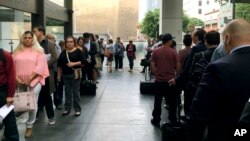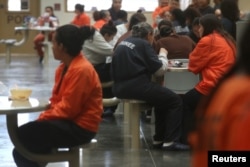A federal court has struck down most of a Trump administration policy that sought to deny asylum to immigrants seeking safety from domestic and gang-related violence in their home countries.
In June, former Attorney General Jeff Sessions personally intervened in the case of a Salvadoran woman known as A-B, denying her asylum as the victim of domestic abuse and releasing expedited removal proceedings that instructed asylum officers to generally deny immigrants the initial credible fear screening if their asylum claims were based on domestic or gang-related violence.
U.S. District Court Judge Emmet Sullivan put a permanent injunction on Sessions’ order, saying it violated U.S. immigration law and that there “is no legal basis for an effective categorical ban.”
Under U.S. law, newly arrived immigrants who express fear of returning to their homes must be given a screening interview to determine credible fear. Those who pass the interview are allowed to pursue their asylum claims in immigration court.
“It is the will of Congress — not the whims of the executive — that determines the standard for expedited removal,” Sullivan said in his 107-page ruling.
The suit was brought by the American Civil Liberties Union on behalf of 12 plaintiffs, half of whom were hurriedly deported under the order.
“Under the new policies, even though government officials found the accounts credible, they concluded the women did not have a ‘credible fear of persecution’ and ordered them to be sent back to the countries where they face grave harm,” the ACLU said in a statement.
Jurisdiction questioned
During a November court hearing, government attorneys had asserted that the U.S. District Court did not have jurisdiction to rule on immigration and should therefore allow the administration’s guidelines to stay in place.
Jennifer Chang Newell, ACLU managing attorney for the Immigrants’ Rights Project, held that the “attorney general does not have the right to issue expedited removal.”
At the time, the ACLU requested the court suspend the expedited removal rule, bring back the six immigrants who had been deported, and grant new proceedings to the 12 immigrants.
Sullivan granted all three requests, blocking the government from “removing plaintiffs who are currently in the United States without first providing credible fear determinations consistent with the immigration laws.” He also ordered that the plaintiffs who had been deported be returned and given new credible fear interviews.
“This ruling is a defeat for the Trump administration’s all-out assault on the rights of asylum-seekers,” Chang Newell said, adding Sessions’ order is “inconsistent with our country’s longstanding commitment to provide protection to immigrants fleeing for their lives.”
Department of Justice spokesperson Steve Stafford had a different take.
“Under the laws passed by Congress, asylum is only for those who have a legitimate fear of persecution on the basis of their race, nationality, religion, political opinion, or membership in a particular social group. Attorney General Sessions’ ruling in matter of A-B was about following that requirement. We are reviewing our options with regard to this ruling, and we will continue to restore the rule of law in our immigration system.”
White House Press Secretary Sarah Sanders further criticized the decision as undermining U.S. immigration law.
“Today’s ruling is only the latest example of judicial activism that encourages migrants to take dangerous risks; empowers criminal organizations that spread turmoil in our hemisphere; and undermines the laws, borders, Constitution, and sovereignty of the United States,” she said in a statement.
“The government is sure to appeal this decision,” Cornell University Law School professor Stephen Yale-Loehr said. “In the meantime, however, the federal court ruling ensures that people fleeing domestic violence or gang violence will have a fair shot at proving they qualify for asylum.”
Flynn case
Sullivan also presided in the case of Lt. Gen. Michael Flynn, President Donald Trump's former national security adviser. On Tuesday, Sullivan delayed sentencing Flynn, whose crimes aroused "my disgust, my disdain."
In keeping with his disdain of government overreach, Sullivan had another moment during an August hearing in the asylum case. When he learned that the government was in the process of deporting a plaintiff in the case and her daughter, he ordered the plane turned around.













